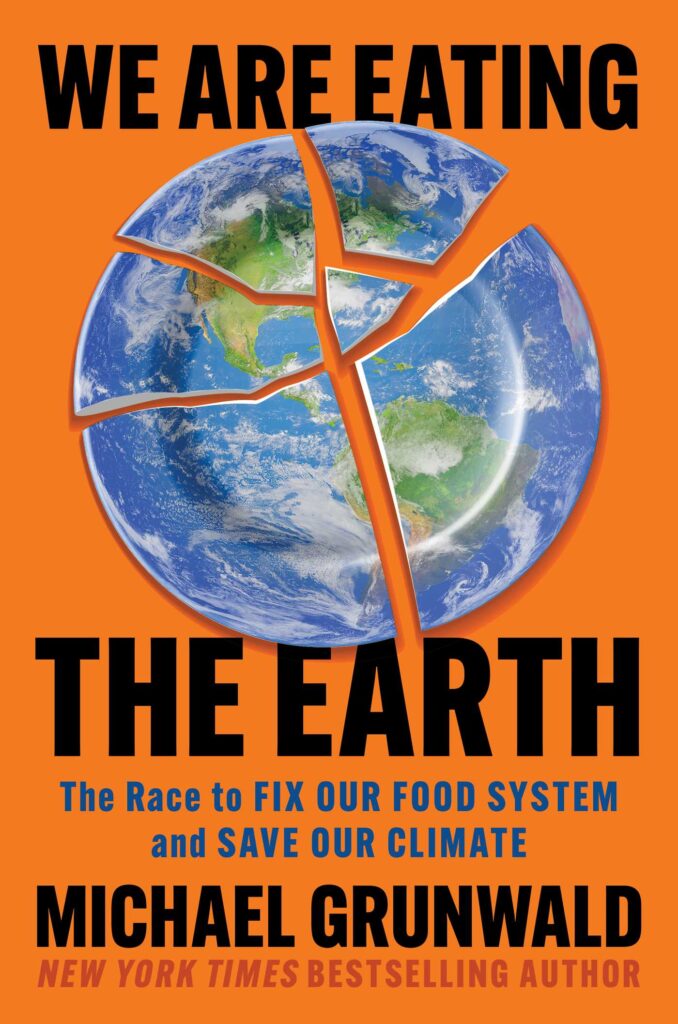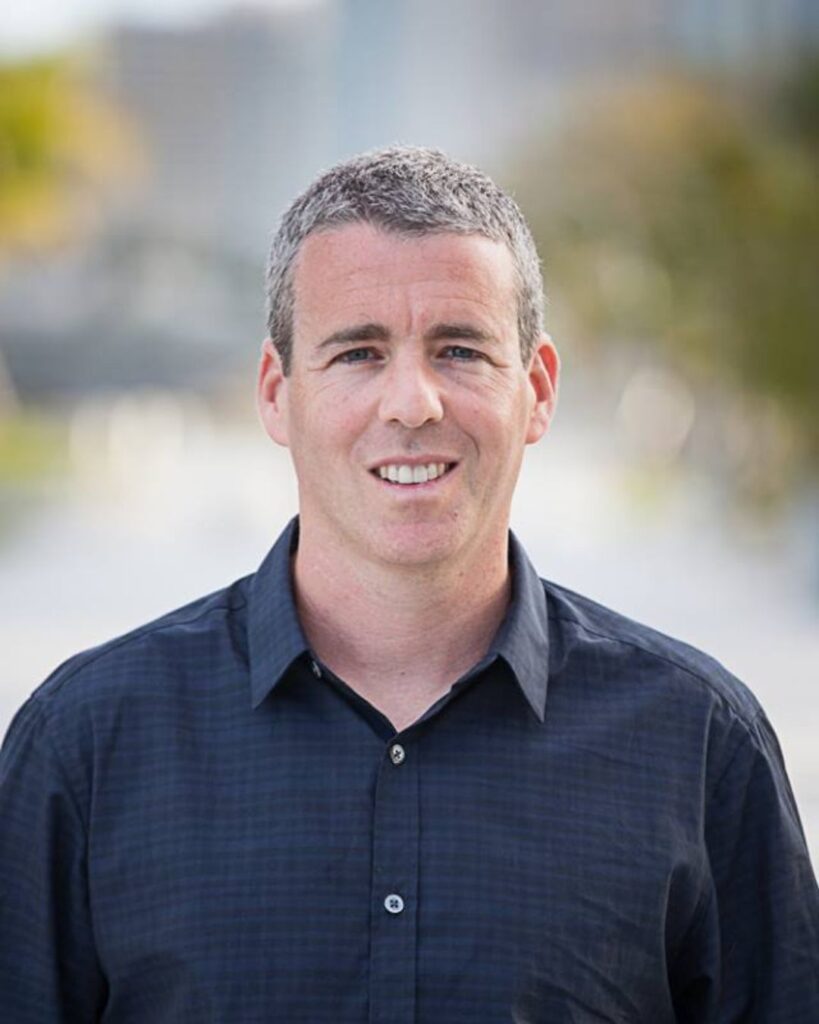
An interview with the author of a new book that exposes how flawed land-use math is derailing climate progress and argues that even eliminating fossil fuels won’t save us unless we fix food production’s massive emissions.
We Are Eating the Earth: The Race to Fix Our Food System and Save Our Climate is the latest book by award-winning journalist and author Michael Grunwald. Its main thesis is that we’re basing our climate decisions on the wrong math when it comes to land use, and that until we solve for this Brazil-sized blind spot, we cannot solve for climate change.
The book is heavy on science, numbers, and policy, which may discourage some, but Grunwald is a gifted storyteller. While he does not offer up any easy answers, Grunwald is a fan of humanity and an admirer of our capacity for world-changing innovation, and the book ends on a hopeful note. Below is an edited and condensed version of my interview with him. For a longer review of the book, see here.
This interview has been edited for length and clarity.
Sonalie Figueiras (Green Queen): What was your plan when you started working on this book about food and climate?
Mike Grunwald: Honestly, I didn’t have one. I was pretty ignorant about the subject, despite being a policy reporter focused on energy and climate. I realised I was missing a huge piece of the puzzle, and I felt someone needed to figure it out, so I guess that would be me. I certainly didn’t know where it would lead.
GQ: Who is this book for? It’s heavy on science and policy, not terribly popular topics for the average Joe and Jane. Did you have a specific audience in mind?
MG: Publishers often tell you to find your “tribe”. The kind of people who are going to be your people, who are going to buy your book. One of the reasons I’m nervous about selling this book is that there isn’t one tribe. There’s going to be something in there that everybody—vegans, climate activists, farmers, foodies—is going to have a problem with.
So I guess this book is for people who are interested in policy, don’t know much about it, and want to learn. I’ve got to plead guilty to putting a lot of science and policy in the book…But I worked really hard to try to make the medicine go down easy, and make it fun and entertaining.
GQ: Let’s talk about the main character. The book focuses on the life and career of Tim Searchinger. Why tell his story?
MG: It happened organically. I’ve known Tim for 25 years. He was an important source for me early in my career. He gave me the tip that led me to write about the Army Corps of Engineers, so he was an important source for me early in my career. I knew him as incredibly honest and fact-driven, but also as someone who can be difficult and has a lot of enemies.
When I was trying to sell the book, someone advised me to have a human element rather than just focusing on abstract issues. Tim became that anchor. When I started looking into food and climate, he was my first call. I realised he had become a leading authority on the intersection of agriculture and climate. His story became central because it quickly became clear this was a story about land use and about “eating the earth.”

GQ: How did you come up with this concept of “eating the earth”?
MG: It came from learning all these statistics, like how two out of every five acres of land on the planet are used for agriculture. And the main reason we’re losing tropical forests is agriculture. I realised that was the core story.
GQ: While the book is mostly about Tim and his journey, you take a detour into the story of Bruce Friedrich, the founder of the Good Food Institute, and the birth of the alternative protein industry for a couple of chapters. How did that happen?
MG: I wanted to tell the whole story about food, agriculture, and climate – the demand side, the supply side, carbon farming, all of it. As you know better than anyone, alternative proteins are a really important part of the food and climate story, and it’s an awesome story. It would have been disingenuous to make it all about Tim, so he disappears from the narrative for a bit. I knew some reviewers might question that, but it felt necessary.
GQ: And from your telling, Tim played a role in connecting Bruce Friedrich with the Bezos Earth Fund, which led to significant investments from Bezos towards three alternative protein research centres in the US, UK and Asia, which was fun to learn about!
MG: Well, I’m just a reporter, but I guess I might have accidentally played a part! [Laughs]. The butterfly wings may have flapped a little bit there.
GQ: Your alt-protein chapters do seem very US-centric, while I would argue it’s a global industry.
MG: That’s fair. The beginning of this tech story was in the US, with people like Bruce Friedrich, Josh Tetrick, Uma Valeti, Pat Brown, and Ethan Brown. I was lucky to attend the GFI Conference in San Francisco in 2019 when there were real conversations about the meat industry potentially disappearing.
Of course, things are happening all over the world, and I can’t cover it all, but I wanted to tell the story of the birth of the sector, which was taking place in the US, so those chapters ended up being more US-centric.
GQ: What are your biggest takeaways from the alt-protein chapters?
MG: What was different about this movement was the idea of trying to sell alt-proteins to non-vegetarians. It wasn’t just for a niche market…So I do feel like those few companies were doing something fundamentally different. I think there was a real story to tell about the start of that. Today, there’s a lot of doom and gloom in the alt-protein world, but I think it’s still a very exciting story.

GQ: Overall, you seem bullish on alt-proteins and hopeful about solutions overall. But the book also acknowledges that progress is slow.
MG: Absolutely. It was important to me not to write a completely negative book. There are dozens of exciting solutions and fascinating people working on them, but none of these solutions has made very much progress yet. [When I started following the alt-protein industry], I was excited about what I was reporting on, but also objective enough to realise some people were being overly optimistic. Some people were predicting the end of animal agriculture by 2035, but that seems unlikely. One of the main messages of the book is that there isn’t just one solution. It’s not an all-or-nothing situation. We’re going to need many solutions. There will be advancements and setbacks.
GQ: You also say Western countries need to eat less meat, but you’re not telling people to stop eating meat entirely. That’s not always a popular message.
MG: No, it isn’t. People often want to hear a simple answer. But it’s about nuance. I believe “better is better than worse.” It’s okay if people make incremental changes. I still eat meat. I cut out beef for a while, but then I went to cattle ranches in Brazil and ate some delicious steak. We’ve been eating meat for millions of years. I think it’s great when people go vegan or vegetarian, but I also think it’s great when people just try to do better. I don’t expect anyone to be perfect.
GQ: That’s interesting. That idea of “perfect” feels very American. As a half-French person, my sense is that Europeans have a more balanced approach, with my French and German friends being very comfortable saying: “I believe in climate action, and also, once in a while, I eat beef.” You see the rise of flexitarianism in Europe, with people reducing their meat consumption but not necessarily going vegan.
MG: I think that’s true. This idea that it’s either black or white seems more American. Europeans tend to have a more balanced approach.
GQ: We do love a silver bullet, and I do think most people are going to ask you: “What’s the one solution, Mike?”
MG: The fact is, even if the rich world reduced beef consumption by 50%—which is extraordinarily ambitious—and let’s say we cut food waste by 50%, which is also really hard, and got rid of biofuels (a ridiculous waste of farmland), we’d still need to raise yields faster over the next 25 years than we did in the last 50. We’d have to make a lot more food with a lot less land. We need to produce more food without using more land.
Efficiency is key for food security and for protecting wildlands. High-yield agriculture is essential for feeding the growing population without destroying more of our planet. We can’t just hand-wave these numbers away and say: “Maybe it won’t get that bad.” We’re on track to deforest another dozen Californias by 2050 if we don’t change. So yeah, we’re going to have to make a lot of changes.
GQ: My sense is that climate people don’t want to hear that no matter what, in the future, we’ll be eating more meat.
MG: Look, the first thing humans do when they’re less poor is eat more meat. It’s silly to pretend otherwise. Consumerism is relevant to climate, but people have to eat. It’s not like fossil fuels, where we can find alternatives. Emissions might be peaking; we can see an energy transition happening. But with food? There are no alternatives. The problem’s getting worse—no positive trends here. We have to roll up our sleeves and get serious.
I can’t give people the simple answer they want, which probably will hurt my book sales and make me a less compelling podcast guest. But this shit is hard.
It’ll take nerds working on niche solutions, plus political, corporate, and behavioural change – none of which is happening now. That’s why I wrote the book. I’m banging my spoon, yelling: “Hey, world, we gotta do something!”
I’m trying a big-tent approach. Industrial ag can learn from regenerative ag, and vice versa. We can honour vegans without demanding universal veganism. Whether your issue is antibiotics, pandemic risk, animal welfare, worker rights, or Big Ag’s terrible politics—all valid. Let’s all try to make things better. We don’t have to agree on everything.
GQ: You wrestle with whether consumers are responsible for the climate. You push back against the popular eco argument – “stop blaming consumers, these are systemic issues” – but also cite Project Drawdown’s list, which says that the top climate actions are wasting less food and eating less meat.
MG: I hate this trend—I wrote about it for Politico during Covid—where it’s uncool to talk about individual action. Headlines like “I work in environmentalism”, “I don’t care if you recycle” or “Going vegan won’t save the world”. The idea is that focusing on personal behaviour makes environmentalists seem like scolds, or worse, does the work of oil companies and Big Meat. But Exxon and Trump aren’t driving your SUV to the mall. McDonald’s and JBS aren’t force-feeding you burgers.
GQ: Though many people live where McDonald’s is cheaper than almost any other food.
MG: Absolutely, and we should fix that. But it’s a bad look for the environmental movement to say: “Climate is an emergency! We’re past 1.5°C – we’re screwed!” and then add: “But your personal emissions don’t matter.” No, it all matters. We need better policy, yes—we must talk about McDonald’s, food systems, and perverse incentives. Too much of my book is about accounting (sorry), because bad climate accounting creates bad incentives.
But you nailed it: eating less beef and wasting less food are good. Beef is far worse than chicken or pork for climate and other reasons. If the average American swapped one beef burger a week for an Impossible Burger, we’d save a Massachusetts-sized chunk of land yearly. I won’t hand-wave individual actions away. They’re not the only thing—ignoring policy is a mistake—but we need better policy, better incentives, and better behaviour. When we fail, we try again.
GQ: That’s fair. Once again, very nuanced. Very tough for people to swallow.
MG: Doesn’t fit on a bumper sticker… [laughs].
GQ: Unlike most non-vegan food-focused climate books and groups, regenerative agriculture does not come off too well in the book. Can you talk more about this?
MG: It’s the ultimate silver bullet narrative: “Farm a little kinder, go back to the old ways, diversify crops, be nice to the soil, and all that atmospheric carbon will magically return to the earth—Kumbaya!” Carbon farming isn’t entirely bullshit, but mostly. Soil carbon is hard to measure, hard to keep in place, and hard to prove you’re not just robbing Peter to pay Paul. Worse, you can’t add significant carbon to soil without adding nitrogen, which has its own climate problems.
The idea that regenerative agriculture will solve climate change? I push back hard. And it’s being pushed by Al Gore, Michael Pollan… And it’s not just the left – Bobby Kennedy, Joe Rogan, plus the Rockefeller Foundation, the UN, and agribusinesses like Danone and General Mills slapping “regenerative” on everything. As a climate solution, it’s wildly oversold.
Look, I’m not just the “industrial ag guy.” The NYT gave my essay [about this] a provocative headline, but yes, we need better industrial ag—not its elimination. My North Star? High-yield agriculture. We must make more food with less land. Factories excel at mass production; factory farms are good at mass food. Sri Lanka tried ditching chemicals cold turkey—yields crashed, and the government fell. Disaster!
That said, I don’t think all regenerative ag is bad. It does improve soil health. In Brazil, I met Bolsonaro-supporting ranchers – definitely not Michael Pollan readers—using regenerative and industrial practices (feedlots, fertilised pastures). They just wanted higher yields. Efficiency and yield are my priorities, which, to some, makes me sound like a corporate shill.
“Factory” is a dirty word. But I’m not a farmer or agronomist. The agroecology crowd argues we haven’t invested enough in organic/regenerative yield research. I’m open to that. Still, yield must be the focus.
GQ: Would you agree that the book is fairly pro-GMO?
MG: Well, at least pro-concept. There’s nothing wrong with them. But I do point out that some claims about their yield benefits are exaggerated.
GQ: Tim offers some climate finance solutions, like air travel taxes and redirecting ag subsidies. How realistic are these?
MG: They’re definitely tough sells, politically speaking. Any changes to agriculture are challenging because the industry is powerful everywhere. People hate any tax increases on food products. But, Denmark has passed significant agricultural reforms that incorporate many of these ideas, showing it’s not impossible. Also, governments give huge amounts of money to farmers. If we start adding strings to that money, requiring more sustainable practices, we could make a significant impact. We just need to be careful about it, so farmers aren’t overly impacted in the long run.
GQ: What’s the main takeaway you want people to get from your book?
MG: We need to be pragmatic and find a middle ground. There are extremes on both sides of this issue, and we need common-sense solutions. We have to recognise that there are multiple valid perspectives here and that we have to work together to find solutions. We need higher yields, but also to make agriculture more efficient.
We Are Eating the Earth: The Race to Fix Our Food System and Save Our Climate by Michael Grunwald (Simon & Schuster, $29.9) is on sale from July 1, 2025, at online and offline bookstores everywhere.
The post Are We Eating The Earth? An Interview with Award-Winning Author Michael Grunwald About His Groundbreaking New Book appeared first on Green Queen.
This post was originally published on Green Queen.